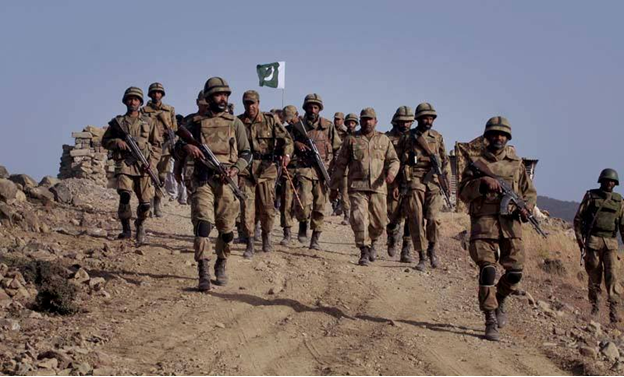Pakistan Approves 15 Billion Rupees For Military Operations Against Taliban
Pakistan Military Ops Against Taliban Get a Budget

NEW DELHI: Pakistan’s Finance Ministry has approved Pakistani Rupees 15 billion for the ongoing military operation Zarb-i-Azb against the Tehreek-i-Taliban Pakistan (TTP) in North Waziristan. Of the total amount, Rupees 8 billion was set to be released within the week, and the remaining amount before the end of the month.
Operation Zarb-i-Azb which translates into "Strike of the Prophet's Sword" was launched following an attack on the Karachi International Airport that killed 39 people and was claimed by the TTP. The operation has involved over 30,000 soldiers and has killed over 200 suspected militants in North Waziristan, the Taliban’s stronghold, with Pakistani Prime Minister Nawaz Sharif reportedly asking Afghan President Hamid Karzai to close the Afghan-Pak border to prevent militants from crossing over.
The Karachi airport attack was claimed by the Tehreek-i-Taliban Pakistan (TTP) and linked directly to the peace talks with the government. TTP spokesperson Shahidullah Shahid referred to the talks as a “tool of war” and confirmed that the attack on the Karachi airport was planned much earlier but had been delayed owing to the ceasefire announced in connection with the peace talks.
Shahid added that the attack was additionally linked to avenging the death of TTP commander Hakimullah Mehsud in a United States drone strike. “We carried out this attack on the Karachi airport and it is a message to the Pakistani government that we are still alive to react over the killings of innocent people in bomb attacks on their villages,” Shahid said.
The TTP spokesperson further referred to the military airstrikes in North Waziristan as a motive behind the attack. These previous airstrikes were perhaps also linked to attacks that have targeted the Pakistani army. Two weeks ago, two Taliban attacks killed nine people, including six soldiers.
The Taliban talks have been characterised by a cycle of dialogue that seems to make no progress, militant attacks, and a military response, which brings the Taliban back on the table.
Most recently, in early May, reports that the talks were back on track seemed to be short-lived a day later as the government - responding to militant attacks in in the northwestern town of Charsadda, Badbher, Chaman and on a fruit and vegetable market in Islamabad - carried out airstrikes in the northwestern tribal belt killing at least 24 militants.
Previously, the talks were called off in February following the killing of 23 paramilitary soldiers by a faction of the Taliban in February. The government had responded with airstrikes in North Waziristan, with the possibility of a full scale military offensive being reported, prompting the Taliban to declare a ceasefire and reiterate its commitments to the dialogue process.
As the talks resumed, the Taliban demanded the release of prisoners and the creation of a demilitarised peace zone in mountainous Shaktoi, South Waziristan as a preconditioning for extending the month-long ceasefire. The government released 19 prisoners with the promise of releasing more, whilst the Taliban announced a ceasefire extension. The release of prisoners was a contentious issue, leading the government to clarify that it was done with the support of the army.
The trend is reflective of the fact that the peace talks were set to fail from the start, with the militants declaring a ceasefire when directly attacked, but failing to enforce it and readily willing to abandon it. During the month long ceasefire, that was called in response to the government launching strikes in North Waziristan after 23 paramilitary soldiers were executed, attacks continued despite the fact that negotiations were in full swing. The most violent of these attacks was the bomb attack on the district courts complex in Islamabad, which was claimed by the previously unknown Ahrarul Hind group.
After the group declared the ceasefire, attacks still continued, with 19 people killed in a powerful bomb attack in Islamabad and 17 people dying in a bomb explosion inside a carriage of a Rawalpindi bound train at Sibi station within a span of a day. Although the Taliban denounced both attacks Intelligence reports alerted police and government officials to attacks in Islamabad, Peshawar and Quetta, stating that these were being planned by factions within the TTP that were opposed to the dialogue process. Pakistani media had in fact carried stories quoting sources that claimed a new group, Ansarul Hind, would carry out attacks with the TTP’s backing.
“TTP will choose the targets and the informal groups under its umbrella will provide support to the Ansarul Hind activists with weapons and other materials,” an anonymous official was quoted in a leading Pakistani paper.
The recent split in the Taliban has complicated the process further, as an already heterogenous militant body that had difficulty imposing decisions taken by the central leadership has fragmented even further.
The government had thus far, always gone back to the negotiating table. The brazen attack on the Karachi airport seems to be the final nail in the coffin, signalling the end of an attempted dialogue with the militants - which was set to fail from the start as the Taliban retained the upper hand and the government lacked even a clear agenda on what it was looking to achieve through the talks.



